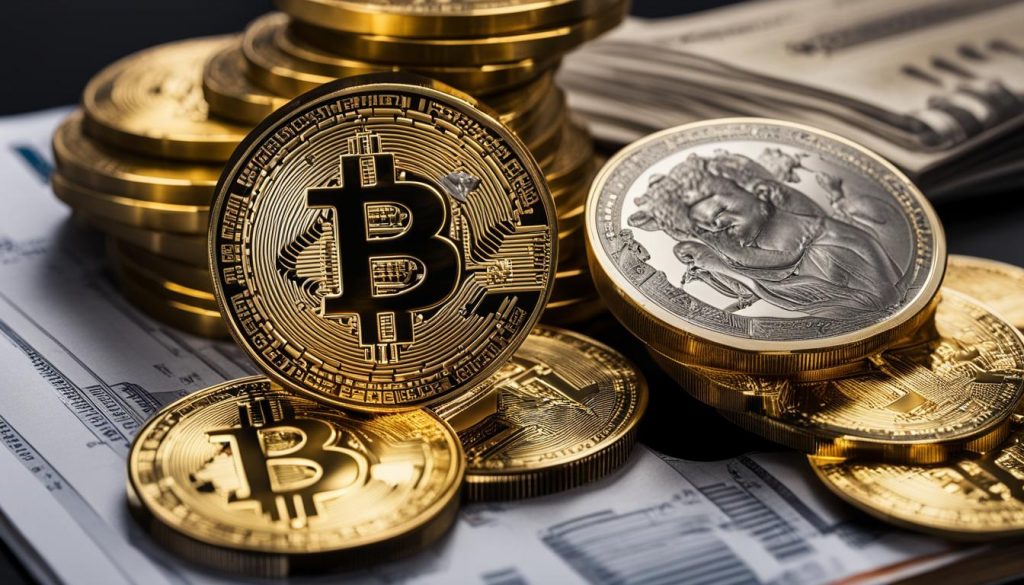As the popularity of cryptocurrency continues to grow, investors and experts have debated whether Bitcoin is a good store of value. With its unique characteristics and digital nature, Bitcoin has emerged as a potential investment asset. In this article, we will examine the concept of Bitcoin as a store of value and analyze its potential benefits and risks.
Key Takeaways
- Bitcoin’s potential as a store of value is a topic of debate among investors and experts.
- A store of value refers to an asset or currency that can be saved and retrieved in the future.
- Traditional examples of store of value include gold, real estate, and fiat currency.
- Critics argue that Bitcoin’s volatility and price swings make it unreliable as a store of value.
- Proponents highlight Bitcoin’s limited supply and increasing demand as factors supporting its potential as a store of value.
What Does Store of Value Mean?
A store of value is a term used to describe an asset or form of currency that retains its value over time and can be stored and retrieved with its value intact. It is an important concept in the realm of finance and investing, as individuals seek to preserve their wealth and assets for the long term. To be considered an effective store of value, an asset must possess certain characteristics that ensure its durability, scarcity, divisibility, acceptability, portability, and uniformity.
Scarcity is a crucial characteristic of a store of value, as it ensures that the asset is in limited supply and cannot be easily replicated or inflated. Divisibility refers to the ability of the asset to be divided into smaller units without losing its value. Acceptability implies that the asset is widely recognized and accepted as a form of payment or exchange. Portability refers to the ease with which the asset can be transported and transferred. Durability indicates the ability of the asset to withstand the test of time and remain intact. Uniformity ensures that each unit of the asset is of equal value and quality.
When considering whether an asset can serve as a reliable store of value, it is important to analyze these characteristics and evaluate how well the asset meets each criterion. By understanding the definition and characteristics of a store of value, we can better assess whether Bitcoin possesses the necessary attributes to be considered a suitable store of value.
Traditional Examples of Store of Value
When it comes to traditional stores of value, three assets often come to mind: gold, real estate, and fiat currency. These assets have long been regarded as reliable methods of preserving wealth and maintaining value over time.
Gold, with its inherent scarcity and historical acceptance, has been a sought-after store of value for centuries. Its tangible nature and universal recognition make it a popular choice for investors and individuals looking to protect their wealth.
Real estate, on the other hand, offers a unique combination of stability and potential appreciation. Owning property provides not only a place to live or generate income but also an asset that tends to retain its value and even increase over the long term.
Fiat currency, such as the US dollar or the euro, is another traditional store of value. These government-issued currencies are widely accepted and backed by the stability and economic strength of their respective nations. While susceptible to inflation, fiat currency still holds a place in the store-of-value landscape.

Comparison of Traditional Stores of Value
| Asset | Scarcity | Acceptability | Portability | Durability | Uniformity |
|---|---|---|---|---|---|
| Gold | High | Universal | Difficult | High | High |
| Real Estate | Location-Dependent | Regional | Immobile | High | Varies |
| Fiat Currency | N/A | Global | High | Medium | Uniform |
While each traditional store of value has its own unique attributes, they all offer ways for individuals to preserve wealth and maintain value over time. However, with the rise of digital currency, such as Bitcoin, the store-of-value landscape is evolving, offering new opportunities and challenges for investors.
Criticisms of Bitcoin as a Store of Value
While Bitcoin has gained significant attention as a potential store of value, it is not without its critics. One of the primary criticisms of Bitcoin is its inherent volatility and price swings. The digital currency has been known to experience drastic price fluctuations, causing concern among investors who view stability as a crucial attribute for a reliable store of value.
Bitcoin’s volatility can be attributed to various factors, including market speculation, regulatory developments, and technological advancements. The lack of centralized control and the relatively small market size compared to traditional assets contribute to its susceptibility to sudden price swings. Critics argue that this volatility makes Bitcoin a risky investment and undermines its potential as a long-term store of value.
Furthermore, skeptics highlight the potential impact of market manipulation and price manipulation on Bitcoin’s value. The lack of regulation and oversight in the cryptocurrency space has raised concerns about fraudulent activities that could manipulate prices artificially. These concerns further fuel doubts about Bitcoin’s ability to serve as a reliable store of value.
Bitcoin’s price swings and susceptibility to market manipulation have raised doubts about its potential as a store of value.
Despite these criticisms, advocates of Bitcoin argue that its volatility is an inherent characteristic of an emerging asset class. They contend that Bitcoin’s price swings can be seen as a reflection of its potential for significant returns and that, over time, volatility may decrease as the market matures. Proponents also emphasize the limited supply of Bitcoin and the increasing demand from individuals, institutions, and even governments as factors that could contribute to its store-of-value potential.
It is important for investors to carefully consider the criticisms surrounding Bitcoin as a store of value and weigh them against potential benefits. Diversification, risk tolerance, and long-term investment goals should all be taken into account when assessing the suitability of Bitcoin as a store of value in an individual’s portfolio.
Advantages of Bitcoin as a Store of Value
Bitcoin offers several key advantages that make it an attractive option as a store of value. These advantages stem from its limited supply and increasing demand, which contribute to its potential for long-term value appreciation.
Limited Supply
One of the primary advantages of Bitcoin as a store of value is its limited supply. Unlike fiat currencies that can be printed infinitely, Bitcoin has a maximum supply of 21 million coins. This scarcity creates a sense of digital gold, with each Bitcoin becoming increasingly valuable as the supply approaches its limit. As a result, Bitcoin holders can potentially benefit from the scarcity-driven increase in value over time.
Increasing Demand
Another advantage of Bitcoin as a store of value is its increasing demand. Bitcoin has gained mainstream recognition and acceptance, with more individuals and institutions adopting it as a digital asset. This growing demand, coupled with its limited supply, can further drive up its value. As Bitcoin continues to establish itself in the financial landscape, its demand is expected to increase, making it an attractive investment option for those seeking to preserve their wealth.
| Advantages of Bitcoin as a Store of Value | |
|---|---|
| Limited Supply | Increasing Demand |
| Scarcity-driven increase in value | Growing adoption and recognition |
Considerations
While Bitcoin offers advantages as a store of value, it is important to consider certain factors. Bitcoin’s volatility can pose risks, as its price can experience significant fluctuations. Investors should be prepared for potential price swings and be comfortable with the associated risks. Additionally, proper storage and security measures are crucial when holding Bitcoin to protect against hacking or loss of digital assets. Conducting thorough research and understanding one’s financial goals and risk tolerance are essential before considering Bitcoin as a store of value.
Comparing Bitcoin to Gold, Fiat, and Real Estate
When considering Bitcoin as a store of value, it is important to compare it to other traditional assets such as gold, fiat currency, and real estate. Each of these assets has its own unique characteristics and advantages, and understanding how Bitcoin stacks up against them can provide valuable insights for investors.
Bitcoin vs Gold
Gold has long been considered a reliable store of value due to its scarcity and historical acceptance. However, Bitcoin offers some distinct advantages over gold. While both assets are finite in supply, Bitcoin’s supply is predetermined, with a maximum limit of 21 million coins. This scarcity, combined with its digital portability, makes Bitcoin an appealing option for those seeking a store of value in the digital age.
Additionally, Bitcoin offers more accessibility and liquidity compared to gold. Buying and selling Bitcoin can be done quickly and easily through various online platforms, while gold often requires physical possession or storage in a secure facility. However, it’s important to note that gold has a long-standing reputation and has been widely accepted as a store of value for centuries, which may give it an edge in terms of trust and stability.
Bitcoin vs Fiat Currency
When comparing Bitcoin to fiat currency, the advantages of Bitcoin become even more apparent. Fiat currency, such as the US dollar, is subject to inflation and government control. This means that the value of fiat currency can erode over time due to factors such as economic policies and market fluctuations.
On the other hand, Bitcoin operates independently from any central authority and is not subject to inflation. Its value is determined by market demand and scarcity, which makes it an attractive option for preserving wealth in an increasingly digital world.
Bitcoin vs Real Estate
Real estate has long been considered a tangible and long-lasting store of value. It provides individuals with a physical asset that can appreciate in value over time. However, real estate lacks the same level of liquidity and accessibility as Bitcoin.
Bitcoin can be easily bought and sold online, allowing for quick and efficient transactions. Real estate, on the other hand, involves a lengthier process of buying and selling, often requiring the assistance of real estate agents and legal professionals.
| Gold | Fiat Currency | Real Estate | Bitcoin | |
|---|---|---|---|---|
| Scarcity | ✓ | ✓ | ✓ | ✓ |
| Portability | ✗ | ✗ | ✗ | ✓ |
| Liquidity | ✗ | ✓ | ✓ | ✓ |
| Inflation Resistance | ✗ | ✗ | ✗ | ✓ |
Table: A comparison of the characteristics of gold, fiat currency, real estate, and Bitcoin as stores of value.
Using Bitcoin as a Store of Value
Bitcoin has gained popularity not only as a digital currency but also as a potential store of value for individuals seeking to preserve their wealth. By holding Bitcoin as an investment, individuals can potentially benefit from long-term value appreciation and protection against inflation.
However, it is crucial to note that Bitcoin’s volatility is a significant factor to consider when using it as a store of value. The cryptocurrency has experienced significant price fluctuations in the past, which can make it a risky asset for wealth preservation.
“Bitcoin’s value has been known to fluctuate rapidly, which can be unsettling for some investors. It’s important to assess your risk tolerance and understand the potential risks involved before committing to Bitcoin as a store of value,” advises financial expert James Anderson.
To mitigate these risks, it is essential to implement proper storage and security measures. Storing Bitcoin in secure digital wallets or cold storage solutions can help safeguard your investment and minimize the risk of theft or loss. Additionally, staying informed about market trends and maintaining a diversified investment portfolio can provide further protection against market volatility.
Table: Bitcoin as a Store of Value – Pros and Cons
| Advantages | Disadvantages |
|---|---|
| Limited supply, potentially leading to increased value over time | High volatility, which can pose risks to wealth preservation |
| Protection against inflation | Lack of regulatory oversight and government backing |
| Accessibility for small investors | Security concerns and potential for hacking |
While Bitcoin offers several advantages as a store of value, it is essential to approach it with caution and conduct thorough research before making any investment decisions. Each individual’s financial goals and risk tolerance will vary, and it is crucial to assess these factors carefully before using Bitcoin as a store of value.
Buy as Little as $30 Worth to Get Started
If you’re interested in exploring Bitcoin as a potential store of value, you’ll be pleased to know that getting started doesn’t require a significant upfront investment. In fact, you can begin with as little as $30. This low barrier to entry makes Bitcoin accessible to a wide range of investors, allowing them to dip their toes into the world of digital currency without a substantial financial commitment.
By investing even a small amount in Bitcoin, you can begin to experience the potential benefits of this digital asset. It’s an opportunity to participate in a financial revolution that is shaping the future of how we store and transfer value. Whether you’re looking to diversify your investment portfolio or simply want to explore new opportunities, starting with Bitcoin can be an exciting and accessible option.
When considering your investment in Bitcoin, it’s important to note that the value of the cryptocurrency can fluctuate. Therefore, it’s recommended to approach with caution and consider your own risk tolerance. While starting with a small investment can be a low-risk entry point, it’s always wise to do your own research, seek guidance from reputable sources, and keep a long-term perspective when it comes to the potential value of Bitcoin.

Remember, the key to successful investing is to make informed decisions based on your own financial goals and circumstances. Bitcoin offers an exciting opportunity for individuals to participate in the digital revolution of money, and starting with a small investment can be the first step towards exploring the potential of this innovative asset.
Conclusion
After examining the characteristics and arguments surrounding Bitcoin’s potential as a store of value, it becomes clear that there is no definitive answer to whether it is a good store of value. The decision ultimately lies with the individual investor and their risk tolerance.
While Bitcoin offers advantages such as limited supply and increasing demand, its high volatility and speculative nature should not be overlooked. It is crucial for investors to conduct thorough research and consider their own financial goals and circumstances before making any investment decisions.
In conclusion, while Bitcoin has gained recognition and acceptance as a potential store of value, it is important to approach it with caution and carefully weigh the risks and benefits. As with any investment, diversification and a long-term perspective are key. Whether Bitcoin proves to be a reliable store of value in the future remains to be seen, but for now, it continues to be a subject of debate and exploration.
FAQ
Is Bitcoin a reliable store of value?
The potential of Bitcoin as a store of value is a topic of debate among investors and experts. Its characteristics and performance should be carefully considered before determining if it is a reliable store of value.
What does store of value mean?
A store of value refers to an asset or form of currency that can be saved and retrieved in the future with its value preserved. It should have certain characteristics such as scarcity, divisibility, acceptability, portability, durability, and uniformity.
What are traditional examples of a store of value?
Traditional examples of a store of value include gold, real estate, and fiat currency. Gold has a long history as a store of value, real estate provides a tangible and long-lasting asset, and fiat currency is accepted by the masses and maintained by governments.
What are the criticisms against Bitcoin as a store of value?
Bitcoin faces criticism as a store of value due to its high volatility and price swings. Skeptics argue that its unpredictable nature makes it risky and unreliable for preserving wealth. The sharp price fluctuations of Bitcoin have led some to question its long-term stability as a store of value.
What are the arguments for Bitcoin as a store of value?
Proponents of Bitcoin as a store of value highlight its limited supply and increasing demand as key factors supporting its potential. With a maximum supply of 21 million coins, Bitcoin is designed to be scarce. As more individuals and institutions adopt Bitcoin, the demand for the digital currency increases, potentially driving up its value over time.
How does Bitcoin compare to gold, fiat currency, and real estate as a store of value?
Bitcoin offers advantages such as digital portability and scarcity compared to gold. It operates independently from any central authority, unlike fiat currency. While real estate provides tangible value, Bitcoin offers greater liquidity.
How can individuals use Bitcoin as a store of value?
Individuals can hold Bitcoin as an investment to preserve their wealth. Bitcoin offers the potential for long-term value appreciation and protection against inflation. However, it’s important to consider the risks associated with Bitcoin’s volatility and ensure proper storage and security measures.
Can I start investing in Bitcoin with a small amount?
Yes, interested individuals can start investing in Bitcoin with as little as $30. This low barrier to entry makes it accessible to a wide range of investors, allowing them to explore its potential as a store of value.
Should I consider Bitcoin as a store of value?
The question of whether Bitcoin is a good store of value ultimately depends on an individual’s perspective and risk tolerance. While Bitcoin has gained recognition and acceptance as a potential store of value, its volatility and speculative nature should be carefully considered. It’s essential for investors to conduct thorough research and make informed decisions based on their financial goals and circumstances.




